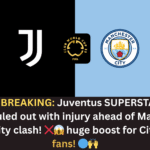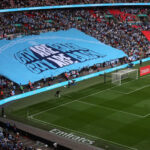FA Cup Final 2025: Manchester City vs. Crystal Palace – A Clash of …

The hallowed turf of Wembley Stadium will once again play host to one of English football’s most prestigious occasions this Saturday evening as Crystal Palace and Manchester City lock horns in what promises to be a fascinating FA Cup final. The 143rd edition of this historic competition reaches its climax with a compelling narrative: the established powerhouse of Manchester City against a Crystal Palace side seeking their first major trophy in over 34 years
For neutrals and passionate supporters alike, this showdown presents an intriguing tactical battle between two contrasting philosophies, playing styles, and club trajectories. While Pep Guardiola’s Manchester City machine continues its pursuit of domestic and European dominance, Crystal Palace arrive at Wembley as the clear underdogs but bolstered by their impressive journey to the final and recent competitive performances against their illustrious opponents.
As the anticipation builds toward the 5:30 PM kickoff on Saturday, followers of the beautiful game are presented with not just a sporting spectacle but a captivating story of ambition, persistence, and the enduring magic of cup football. The FA Cup, with its rich traditions and capacity for unexpected outcomes, provides the perfect stage for what could become a classic final.
Despite the obvious disparity in resources and consistent league positioning between these two clubs, their recent encounters have produced remarkably entertaining and competitive affairs. The head-to-head statistics from recent seasons reveal contests that have frequently delivered goals, drama, and occasionally surprising results.
The aggregate score across their last four competitive fixtures stands at a high-scoring 13-8 in Manchester City’s favor, with both teams finding the net at least twice in each of these encounters. This attacking pattern defies the conventional wisdom that might expect Palace to adopt ultra-defensive tactics against City’s formidable forward line.
Their most recent Premier League clash earlier this season produced a seven-goal thriller that epitomized the unexpectedly open nature of this fixture. City ultimately prevailed, but not before Palace had demonstrated their capacity to trouble even the most sophisticated defensive systems in world football.
While Palace’s last victory against City dates back to October 2021 – a memorable 2-0 triumph at the Etihad Stadium courtesy of goals from Wilfried Zaha and Conor Gallagher – they have consistently proven themselves capable of competing with Guardiola’s side. That victory remains significant as one of only a handful of domestic defeats suffered by City at home during Guardiola’s tenure.
More recently, in March 2023, City secured a narrow 1-0 win before the teams played out an entertaining 4-2 encounter in August 2022. These results suggest Palace consistently find ways to trouble their more decorated opponents, providing hope for Eagles supporters heading into Saturday’s final.
Crystal Palace’s path to their first FA Cup final since 2016 has been one of perseverance, tactical discipline, and moments of individual brilliance. The South London club has navigated a challenging route to Wembley, overcoming Premier League opposition and potential banana skins from lower divisions with equal resolve.
Their journey began with a professional performance against Championship side Millwall in a potentially treacherous South London derby, before successive victories against Brighton, Everton, and Southampton set up a semi-final showdown with Chelsea. At Wembley last month, Palace produced perhaps their performance of the season, combining defensive resilience with counter-attacking precision to secure a memorable 2-1 victory over their London rivals.
This cup run has coincided with a period of steady progression under their management, establishing themselves as a stable Premier League outfit with an increasingly distinctive playing identity. The development of academy graduates alongside shrewd recruitment has created a balanced squad capable of competing against the division’s elite on their day.
For Palace, Saturday represents more than just a football match; it’s an opportunity to create history and secure their first major trophy since their 1991 Full Members Cup success. More significantly, victory would deliver their first FA Cup triumph, having twice finished as runners-up in 1990 and 2016.
The significance of ending this trophy drought cannot be overstated for a club that has experienced considerable turbulence throughout its history, including financial difficulties and relegations. Success at Wembley would represent vindication for the current ownership model and strategic approach that has prioritized sustainable growth over quick fixes.
In stark contrast to their opponents, Manchester City arrive at Wembley with the weight of expectation firmly on their shoulders. Under Pep Guardiola’s masterful guidance, the club has established itself as England’s dominant football force, collecting Premier League titles with remarkable consistency while regularly challenging in cup competitions.
City’s route to the final has been characteristically efficient, sweeping aside Huddersfield Town, Tottenham Hotspur, Luton Town, and Newcastle United without conceding a single goal. This defensive solidity, complemented by their renowned attacking fluency, makes them strong favorites to lift the trophy for the seventh time in their history.
For Guardiola, whose philosophy continues to influence football thinking worldwide, the FA Cup represents another opportunity to enhance his remarkable legacy in English football. Having already secured the Premier League title this season, City are targeting another domestic double to further cement their era of dominance.
The depth of quality throughout City’s squad remains their defining advantage. Even with potential rotation or injury concerns, Guardiola can call upon world-class alternatives in virtually every position. This strength in depth has been critical to their sustained success across multiple competitions in recent years.
Success on Saturday would further validate the substantial investment from the club’s Abu Dhabi ownership while reinforcing City’s status as the team to beat in English football. However, they will be acutely aware that cup finals can produce unpredictable outcomes, particularly against opponents who have previously demonstrated the tactical acumen to disrupt their rhythm
The contrasting approaches of these two sides will create fascinating individual and collective contests across the Wembley pitch. Several key battles are likely to prove decisive in determining the outcome:
Perhaps the most critical tactical element will be Palace’s ability to transition quickly from defense to attack while navigating City’s sophisticated pressing structure. Palace have demonstrated considerable improvement in their counter-attacking efficiency this season, utilizing the pace and directness of their forward players to exploit spaces behind advancing opposition defenders.
City’s ability to counter-press immediately after losing possession has long been a cornerstone of Guardiola’s system. The speed with which they regain shape and pressure the ball will be crucial in neutralizing Palace’s transitional threat. The midfield battle will be particularly significant, with City likely to dominate possession but potentially vulnerable during turnover situations.
Kevin De Bruyne continues to be City’s primary creative force, capable of unlocking even the most organized defenses with his visionary passing range. Neutralizing his influence represents a significant challenge for Palace, who will likely employ a disciplined mid-block defensive structure with selective pressing triggers.
Palace’s defensive solidarity has improved markedly in recent months, with their center-back partnership developing effective communication and positional awareness. Their ability to maintain concentration for prolonged periods without possession will be severely tested against City’s patient build-up play and rotational movement patterns.
With margins potentially fine in such a high-stakes encounter, set-piece execution could prove decisive. Palace have developed increasing potency from dead-ball situations, utilizing their aerial presence effectively. Conversely, City’s technical precision makes them equally dangerous from free-kicks and corners, particularly through specialist takers like De Bruyne.
Defensive organization during these moments will be crucial for both teams, with concentration lapses potentially fatal at this elite level. The psychological dimension of set-pieces – particularly late in a closely contested final – adds another layer of intrigue to this tactical component.
Kevin De Bruyne: The Belgian maestro remains City’s creative heartbeat, capable of producing defining moments on the grandest occasions. His vision, passing range, and set-piece delivery make him a constant threat, as demonstrated by his goal in their recent encounter with Palace.
Mateo Kovačić: The Croatian midfielder has added another dimension to City’s engine room with his progressive carrying ability and tactical intelligence. His goal against Palace earlier this season highlighted his capacity to influence games from deeper positions.
Erling Haaland: Despite not featuring among the goalscorers in recent games against Palace, the Norwegian striker’s phenomenal scoring record makes him an ever-present danger. His movement, physical presence, and clinical finishing will require constant vigilance from Palace’s defensive unit.
Eberechi Eze The technically gifted midfielder has elevated his performance level consistently this season, combining creative flair with increasing end product. His ability to retain possession under pressure and progress the ball will be vital to Palace’s transitional approach.
Marc Guéhi: The England international defender has developed into one of the Premier League’s most consistent center-backs, combining physical robustness with impressive distribution. His leadership and organizational skills will be critical against City’s multi-faceted attack.
**Omar Marmoush**: The summer signing has adapted impressively to Premier League football, providing goal threat and creative impetus. His scoring contribution in the teams’ last meeting demonstrates his capacity to perform against elite opposition.
The FA Cup holds special significance for both clubs, though for contrasting reasons. For Manchester City, success in this competition has become somewhat expected during their recent period of domestic dominance, with the club securing the trophy in 2019 and 2023 under Guardiola’s management.
For Crystal Palace, the FA Cup represents unfinished business and the pursuit of a defining moment in the club’s modern history. Their previous final appearances in 1990 and 2016 both ended in defeat, with the latter coming against Manchester United following an impressive run under Alan Perdew.
The competition itself maintains its cultural importance in English football despite the increasing financial prominence of the Premier League and European competitions. For players, supporters, and coaching staff, the tradition of the FA Cup final at Wembley continues to hold a special allure – representing for many the fulfillment of childhood dreams regardless of their nationality or background.
Pep Guardiola enters his fourth FA Cup final with characteristic focus, having consistently reinforced the importance of every competition to his players. His preparation will be meticulous, analyzing Palace’s structural tendencies while developing specific tactical approaches to counter their strengths.
In pre-match comments, Guardiola has been typically respectful of Palace’s quality and threat, noting: “We have experienced difficult moments against them in recent seasons. They have players who can punish any lack of concentration, and in a final, these details become even more significant. We must prepare with the same intensity and respect as always.”
For Oliver Glasner, who took charge at Palace midway through the season, reaching the FA Cup final represents a remarkable achievement in his short tenure. The Austrian has implemented an increasingly effective tactical framework that balances defensive organization with counter-attacking threat.
Glasner has embraced the underdog status while maintaining belief in his team’s capacity to create a historic upset: “We have shown throughout this season that we can compete with any opponent when we execute our game plan effectively. This is one match where anything is possible if we maintain our discipline and convert the opportunities we create.”
The contrast between the two clubs’ supporter bases adds another compelling dimension to this final. Palace fans are renowned for their passionate vocal support, creating one of the Premier League’s most atmospheric home environments at Selhurst Park. The south London faithful will travel to Wembley in significant numbers, generating noise levels that belie their club’s relative size.
For City supporters, success has become a regular occurrence during the Guardiola era, though this has not diminished their appreciation for trophy-winning moments. Their section of Wembley will feature the sky blue colors that have become increasingly prominent at major finals over the past decade.
The allocation of approximately 35,000 tickets to each club ensures a balanced atmosphere inside Wembley, with the remaining capacity distributed among the football family including grassroots organizations and competition sponsors. The traditional pre-match ceremonies, including the national anthem and player presentations to dignitaries, will maintain the cup final’s distinctive ceremonial elements.
The bookmakers understandably install Manchester City as clear favorites, with odds around 1/3 reflecting their status as Premier League champions and superior record throughout the season. Crystal Palace are available at much longer odds of around 10/1, highlighting their underdog status despite their competitive performances against City in recent years.
Special promotional offers from various bookmakers, including enhanced odds for new customers, reflect the significant public interest in the fixture. talkSPORT BET’s offer of 30/1 on Manchester City or 60/1 on Crystal Palace represents particularly attractive value for those yet to register with the platform.
Football analysts and former professionals appear divided on the likely competitiveness of the final, though most predict ultimate victory for City. The consensus suggests Palace will need to produce their performance of the season while hoping City operate below their optimal level to create the conditions for an upset.
Former Palace striker Clinton Morrison believes his former club can cause problems: “Palace have shown they can hurt City in recent games. If they can stay compact defensively and utilize their pace on the counter-attack effectively, they have a genuine chance of creating something special.
Meanwhile, ex-Manchester City defender Micah Richards expects his former employers to have too much quality: “When City are focused and at their best, they remain virtually unplayable. Palace will create moments of concern, but City’s experience in these occasions gives them a significant advantage.
The final will be broadcast live on both BBC and ITV in the United Kingdom, maintaining the tradition of free-to-air coverage for the competition’s showcase event. International broadcasters across Europe, Asia, Africa, and the Americas will ensure a global audience of hundreds of millions, reinforcing the FA Cup’s worldwide appeal despite competition from other major sporting events.
Comprehensive radio coverage will be provided by BBC Radio 5 Live and talkSPORT, with both stations offering expert commentary and analysis throughout the afternoon and evening. Digital platforms will provide additional content including behind-the-scenes access, supporter reactions, and tactical analysis across social media channels.
As Wembley prepares to host another chapter in the FA Cup’s illustrious history, this final contains all the ingredients for a compelling spectacle. The established powerhouse against the ambitious challenger; tactical sophistication versus counter-attacking threat; and the pursuit of continued success against the dream of historic achievement.
While Manchester City enter as justifiable favorites based on their consistent excellence across all competitions, Crystal Palace have demonstrated sufficient quality and tactical intelligence to suggest they can make this a competitive occasion. The recent goal-laden encounters between these sides point toward an entertaining final rather than a cautious, attritional affair.
For neutrals, the hope will be for a contest that showcases the best qualities of both teams – City’s technical brilliance and structural perfection balanced against Palace’s resilience, transition speed, and set-piece threat. For supporters of both clubs, emotions will inevitably fluctuate between nervous anticipation and passionate engagement throughout the ninety minutes and potentially beyond.
Whatever the outcome, Saturday’s final promises to deliver another significant milestone in the stories of both clubs – either reinforcing City’s domestic supremacy or providing Palace with their defining modern moment. The beauty of the FA Cup lies in its capacity to create memories that endure for generations, regardless of a club’s size or historical standing.
As the teams emerge from the Wembley tunnel on Saturday evening, they will participate in a tradition that transcends the increasingly commercial nature of modern football. For those fortunate enough to attend or watch worldwide, the hope is for a final worthy of the occasion’s prestige and historical significance.















